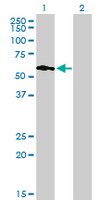ST1517 Sigma-AldrichAnti-PIP5K3 Mouse mAb (6C7)
This Anti-PIP5K3 Mouse mAb (6C7) is validated for use in ELISA, Immunoblotting, Immunocytochemistry, Paraffin Sections for the detection of PIP5K3.
More>> This Anti-PIP5K3 Mouse mAb (6C7) is validated for use in ELISA, Immunoblotting, Immunocytochemistry, Paraffin Sections for the detection of PIP5K3. Less<<Synonyms: Anti-Phosphatidylinosi-3-Phosphate-Phosphatidylinosi-5-Kinase Type 3
Recommended Products
Overview
| Replacement Information |
|---|
Key Spec Table
| Species Reactivity | Host | Antibody Type |
|---|---|---|
| H | M | Monoclonal Antibody |
Pricing & Availability
| Catalogue Number | Availability | Packaging | Qty/Pack | Price | Quantity | |
|---|---|---|---|---|---|---|
| ST1517-100UG |
|
100 μg |
|
— |
| References | |
|---|---|
| References | Tsuruta, F., et al. 2009. J. Cell Biol. 187 279. |
| Product Information | |
|---|---|
| Form | liquid |
| Formulation | In PBS, pH 7.2. |
| Negative control | 293T cells |
| Positive control | Human testes tissue, HeLa cells |
| Preservative | None |
| Quality Level | MQ100 |
| Physicochemical Information |
|---|
| Dimensions |
|---|
| Materials Information |
|---|
| Toxicological Information |
|---|
| Safety Information according to GHS |
|---|
| Safety Information |
|---|
| Product Usage Statements |
|---|
| Packaging Information |
|---|
| Transport Information |
|---|
| Supplemental Information |
|---|
| Specifications |
|---|
| Global Trade Item Number | |
|---|---|
| Catalogue Number | GTIN |
| ST1517-100UG | 04055977224184 |
Documentation
Anti-PIP5K3 Mouse mAb (6C7) SDS
| Title |
|---|
References
| Reference overview |
|---|
| Tsuruta, F., et al. 2009. J. Cell Biol. 187 279. |














